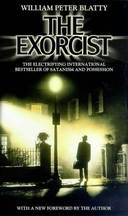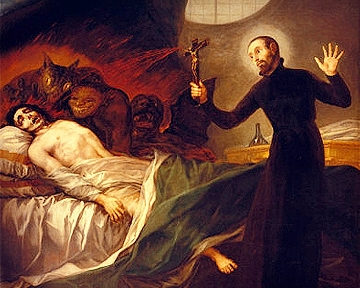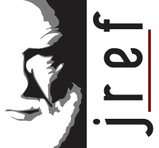A video has surfaced of a reported exorcism as it was taking place last February behind the closed doors of a Roman Catholic church in Vranov nad Dyji, Czech Republic. A 26 year old visitor heard screams and filmed through the keyhole of the door. Not much is visible; there is plenty of screaming and obscenity (in another language) but nothing supernatural happens from this perspective. The drama that unfolded is what we would expect an exorcism to look like from our familiarity with sensational news reports. Only in the movies, in fiction, are there visions of horror that break the bounds of physics or human capabilities. In reality, exorcisms at their most basic, are an interaction between the victim in some disturbed state and the people who are enacting the ritual. Some might say the ritual enables the victim, encouraging the expression of possession. For some afflicted people, they may benefit psychologically from the process.
The Czech priest confronted over the released video says they were asking for God’s help to protect the anonymous person in the church. He is quoted as remarking, "Of course it helps.”
Does it really help, or is this reinforcement of an antiquated belief system harmful? Therein lies a tricky question for religious officials, psychologists, and the skeptically-minded about the value of exorcism. Most rationalists would not condone an exorcism, likely feeling that the potential for harm that could occur is unethical or the endorsement of belief in demons is nonsense. What once was a given fact - evil spirits can possess people, and had been usurped by modern medicinal practice, has recently been re-embraced by the Catholic Church and endorsed through rejuvenation of the exorcism ritual.
Does it really help, or is this reinforcement of an antiquated belief system harmful? Therein lies a tricky question for religious officials, psychologists, and the skeptically-minded about the value of exorcism. Most rationalists would not condone an exorcism, likely feeling that the potential for harm that could occur is unethical or the endorsement of belief in demons is nonsense. What once was a given fact - evil spirits can possess people, and had been usurped by modern medicinal practice, has recently been re-embraced by the Catholic Church and endorsed through rejuvenation of the exorcism ritual.
On November 11, 2014, the United States Conference of Catholic Bishops approved an English translation of the Rite of Exorcism that was published by the Vatican in 1999. The vote was 179 “yes” to 5 “no.” Pope Francis recognized 250 priests across 30 countries who are members of the International Association of Exorcists which many observers saw as a surprising step backwards in time for the church.
The church sees exorcism as something of a last resort and repeatedly notes that the cases are carefully evaluated by medical professionals to address medical or psychological problems. Who does these evaluations? Are the psychiatric evaluators Christian? What are their criteria for concluding that, yes, this person can not be helped by Western medicine and must be treated spiritually?
The church sees exorcism as something of a last resort and repeatedly notes that the cases are carefully evaluated by medical professionals to address medical or psychological problems. Who does these evaluations? Are the psychiatric evaluators Christian? What are their criteria for concluding that, yes, this person can not be helped by Western medicine and must be treated spiritually?
Curiously, as noted in this Catholic news agency piece, exorcism is “not magic. It is the Church imploring God to come to the aid of the person afflicted.” This can be interpreted in a secular way - if the troubled person believes that they can be helped with this ritual, then perhaps they really are helped. It is plausible that many cases of deliverance or exorcism have been successful because people have “named” their troubles and outwardly cast them away, like the devil, to be gone and leave them free.
Professor Christopher French, Head of the Anomalistic Psychology Research Unit of the Department of Psychology at Goldsmiths, University of London has studied the psychology of possession. He also thinks that, under certain circumstances, people can benefit from exorcism.
Professor Christopher French, Head of the Anomalistic Psychology Research Unit of the Department of Psychology at Goldsmiths, University of London has studied the psychology of possession. He also thinks that, under certain circumstances, people can benefit from exorcism.
“As I believe that "possession" is a purely psychological phenomenon, any psychosomatic symptoms might be cured by any form of treatment that the victim believes in. Also, adoption of the "possessed" role sometimes allows people to let off steam without being held responsible for their actions.”
Dr. French is clear that exorcism will not directly help anyone who has an underlying neurological condition, although, he says, “If the condition was aggravated by stress and the ritual reduced the stress, it might produce temporary relief.”
This is not to make light of the several downsides to exorcism. There have been several cases of families who subjected “possessed’ elders, women, the handicapped, and children to abuse. In some cases, this has resulted in death.
This is not to make light of the several downsides to exorcism. There have been several cases of families who subjected “possessed’ elders, women, the handicapped, and children to abuse. In some cases, this has resulted in death.

Yet, the popular belief in exorcism is growing. There is a reasonable conclusion to be drawn from the popular cultural depictions of exorcism in movies, books and on television: the more people see of even fictional depictions of possession and exorcism, the more accepting they become of the concept. From The Exorcist in 1973 to The Conjuring in 2012 and the latest Deliver Us from Evil in 2014, the idea of demonic possession and the power of exorcism saturates popular culture.
Exorcism is widespread in many different religions and belief systems. We most often encounter stories associated with Roman Catholic dogma, Charismatic Christian sects and Islamic belief.
There is a difference between Catholic church-sanctioned exorcism, as exhibited in the Czech church, and any ritual undertaken by family members, faith healers or even paranormal investigators. But in general, a person is aware of the expectations of what it means to appear possessed and what goes on in an exorcism. Members of the sanctioned International Association of Exorcists may be more careful in their use of the highly emotionally charged, controversial ritual.
When individuals steeped in belief in the devil and demons face a troubled person, whom they interpret as possessed, tragedy has resulted. Many afflicted people around the world are unwillingly subjected to brutal exorcism rituals that result in injury or death. The danger lies in the belief that the person is not their right self, but an “other” that must be removed to free the person to return to a normal state.
Exorcism is widespread in many different religions and belief systems. We most often encounter stories associated with Roman Catholic dogma, Charismatic Christian sects and Islamic belief.
There is a difference between Catholic church-sanctioned exorcism, as exhibited in the Czech church, and any ritual undertaken by family members, faith healers or even paranormal investigators. But in general, a person is aware of the expectations of what it means to appear possessed and what goes on in an exorcism. Members of the sanctioned International Association of Exorcists may be more careful in their use of the highly emotionally charged, controversial ritual.
When individuals steeped in belief in the devil and demons face a troubled person, whom they interpret as possessed, tragedy has resulted. Many afflicted people around the world are unwillingly subjected to brutal exorcism rituals that result in injury or death. The danger lies in the belief that the person is not their right self, but an “other” that must be removed to free the person to return to a normal state.
Dr. French argues that the evidence for real demon possession is not reasonable based on the evidence but that conditions and behaviors can be directly explained by neuropathology, brain malfunctions, psychosis, or a social role - a learned behavior.
In less developed nations with lower levels of education and far less access to health care, people still interpret epileptic seizures, Tourette’s syndrome, or other known disorders, as spiritual afflictions. But not all cases may be medically definable. Priests report that victims appear to be harboring another personality of an evil or destructive nature. They exhibit a different demeanor, a foreign voice, and uncommon actions. Those with a scientific worldview would point to the possibility of dissociative identity disorder (previously called multiple personality disorder), or a call for attention, even faking. There can be cultural benefits to the individual who claims to be possessed, following the “script” of what the rest of their society thinks possession looks like. Socio-cognitive factors likely play a part in many modern possession and exorcism cases.
Professor French notes that possession of the holy spirit is encouraged by some religions. If you are possessed by an evil spirit, it, not you, are deemed responsible for actions. As in the case of women in repressed societies, they can act out taboo behavior in public without repercussion. Children and workers may act possessed in order to gain some sort of control of situation that seems desperately stressful and out of their control - strict school rules or difficult working conditions, for example.
There is no easy answer to the question of how to stem the growth of belief in possession and how to respond to the increasing requests for exorcisms. As hard as it may be not to dismiss concepts of possession and exorcism out of hand as archaic and unenlightened, there are modern elements to it - facets of culture that recognize and accept it as real and incorporate it strongly into their framework of the world. Many people have little opportunity to fight against beliefs in which they are immersed and trapped. Therefore, they will use whatever outlet that they can, even extreme behaviors that seem excessive to rational people. Even though the idea of demons seems like nonsense, it’s actually a bit more complicated than that. In order to address scenarios labeled as possession and treated via exorcism, we need to gain greater understanding.
In less developed nations with lower levels of education and far less access to health care, people still interpret epileptic seizures, Tourette’s syndrome, or other known disorders, as spiritual afflictions. But not all cases may be medically definable. Priests report that victims appear to be harboring another personality of an evil or destructive nature. They exhibit a different demeanor, a foreign voice, and uncommon actions. Those with a scientific worldview would point to the possibility of dissociative identity disorder (previously called multiple personality disorder), or a call for attention, even faking. There can be cultural benefits to the individual who claims to be possessed, following the “script” of what the rest of their society thinks possession looks like. Socio-cognitive factors likely play a part in many modern possession and exorcism cases.
Professor French notes that possession of the holy spirit is encouraged by some religions. If you are possessed by an evil spirit, it, not you, are deemed responsible for actions. As in the case of women in repressed societies, they can act out taboo behavior in public without repercussion. Children and workers may act possessed in order to gain some sort of control of situation that seems desperately stressful and out of their control - strict school rules or difficult working conditions, for example.
There is no easy answer to the question of how to stem the growth of belief in possession and how to respond to the increasing requests for exorcisms. As hard as it may be not to dismiss concepts of possession and exorcism out of hand as archaic and unenlightened, there are modern elements to it - facets of culture that recognize and accept it as real and incorporate it strongly into their framework of the world. Many people have little opportunity to fight against beliefs in which they are immersed and trapped. Therefore, they will use whatever outlet that they can, even extreme behaviors that seem excessive to rational people. Even though the idea of demons seems like nonsense, it’s actually a bit more complicated than that. In order to address scenarios labeled as possession and treated via exorcism, we need to gain greater understanding.
Sharon Hill, P.G., EdM, is a geologist with a specialty in science and society and public outreach for science. She is the creator and editor of the unique critical thinking blog DoubtfulNews.com and researches, writes and speaks about the paranormal, monsters and natural phenomena for various publications including Skeptical Inquirer and Fortean Times. Follow her on Twitter @idoubtit.



